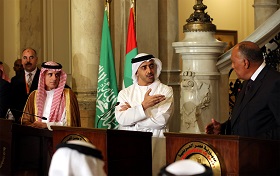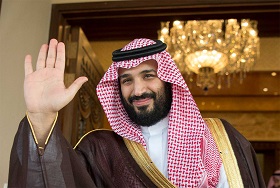For the third year running, autumn has been a time of surprises for the Lebanese people courtesy of their Prime Minister, Saad Hariri. Never one to hide his close ties to Saudi Arabia, Hariri has continually acted as the chief Lebanese proponent of the Saudis’ foreign policy and regional leadership, if not their outright conduit. Recently, however, Hariri seems to have failed to meet the Saudis’ expectations. On November 4, 2017, he appeared on Saudi television to announce his resignation as Prime Minister of Lebanon.
Hopes for pro-Saudi policies conducted as a kind of “thank you” on the part of the elected president failed to materialize, even though the first official visit made by the newly elected leader Michel Aoun was to Saudi Arabia. This past summer, it became clear that the country led by King Salman had taken a course towards “breaking stereotypes.” As the ghost of Islamic State receded into the past, the Kingdom was more and more openly reverting to its desire to be a dominant force in the region, primarily as a counter to Iran.
Hariri’s demarche – the result of pressure being exerted on the prime minister by the Saudi rulers – and the subsequent developments were directed at President Aoun and public opinion. The goal is to force the Lebanese authorities to bar the military wing of Hezbollah from conducting effective political propaganda and legally participating in operations held jointly with the military, as well as to decrease the domestic influence of the pro-Shia party. This arm-twisting is intended to undermine Iran’s influence in Lebanon.
On November 4, 2017, Prime Minister of Lebanon Saad Hariri announced his resignation on Saudi television. In his speech, Hariri accused Iran of spreading discord in the region, motivated by hatred for Arabs, and called Lebanon’s Hezbollah movement “Iran’s arm in Lebanon and other Arab countries” (meaning, of course, Syria).
The Lebanese politician, who holds Saudi citizenship and owns Saudi Oger (a construction company that declared bankruptcy in the summer), arrived in the Kingdom on November 3, made his announcement, and then did not return to Beirut for some time, which fueled the rumours that he was being held under house arrest in Riyadh.
Hariri had held the post of Prime Minister once before, serving as head of government in 2009. He left office following a boycott by several ministers who had resigned in January 2011, thus technically making the government illegitimate. When Lebanon’s new president was elected on October 31, 2016, Hariri was once again appointed Prime Minister (there was a clear arrangement that ruled out all other options). He took about six weeks to form the government (made up of 30 ministers). The government finally commenced its work on December 18, 2016, making Hariri’s tenure at the moment of his resignation less than a year.
The circumstances surrounding his resignation and the context in which it took place are intriguing. Just before Hariri made his announcement, senior advisor to the Supreme Leader of Iran in international affairs Ali Akbar Velayati visited Beirut and held talks with the country’s leaders. A day before that, the Royal Saudi Air Defense allegedly intercepted a ballistic missile launched by the Houthis of Ansar Allah at King Khalid International Airport in Riyadh. Saudi Arabia immediately accused Iran of aiding and abetting the Houthis and, therefore, of an indirect attack on the Kingdom. Hariri’s statement coincided almost perfectly with an unprecedented “purge” directed by Saudi Arabia’s heir apparent of members of the ruling house that involved the detention of 11 princes of the House of Saud and the seizure of their bank accounts.
The “arrested” Prime Minister himself was in no hurry to calm the waters. It was only on November 12, in an announcement broadcast live on Lebanon’s Almustaqbal TV channel, that he said he was going to return to Beirut to finally submit his letter of resignation to President Aoun. Characteristically, he named the direct threat to his life as one of the reasons for his unexpected decision to stand down (forcing the Lebanese people to recall the February 14, 2005 assassination of his father, former Prime Minister Rafic Hariri, whom the son revered).
During that time, a major campaign was launched in Beirut. The annual autumn marathon held on November 12 was presented as a drive in support of the Prime Minister. Around 50,000 runners from 99 countries participated; banners were hung in Beirut saying “Saad, we stand with you.” The President of Lebanon himself officially requested that the Saudi authorities explain why the head of his government had been detained, and subsequently, he discussed the issue with Saudi Arabia’s chargé d’affaires ad interim in Beirut.
In the meantime, the media and Middle Eastern experts around the world spent weeks heatedly discussing the “sudden resignation” of the Lebanese Prime Minister, which had not yet formally taken place. Strictly speaking, a resignation only becomes official once it has been accepted by the country president. Since Hariri never submitted a letter of resignation, accepting or rejecting it was not even an issue at the time.
For the third year running, autumn has been a time of surprises for the Lebanese people courtesy of their Prime Minister, Saad Hariri. Never one to hide his close ties to Saudi Arabia, Hariri has continually acted as the chief Lebanese proponent of the Saudis’ foreign policy and regional leadership, if not their outright conduit. Recently, however, Hariri seems to have failed to meet the Saudis’ expectations. There was discontent with the leading politician of the pro-Sunni March 14 Alliance, who never managed to completely bring the members of the Alliance under control and overcome the squabbles between parties and individual politicians. The end of President Michel Suleiman’s term marked the beginning of a period of open bargaining for key posts in the Lebanese government between members of the motley range of the political upper crust. Apparently, the politicians did not so much covet the presidential office itself, as they longed for the opportunity to place “their” people at the top of law enforcement, military and security agencies.
Predictably, throughout this period of “presidential vacuum,” Hariri urged his colleagues to come to an agreed decision and put an end to the crisis. We can deduce the kind of decision that Hariri himself envisioned from the fact that his political opponents – Michel Aoun’s supporters – boycotted the sessions of the Chamber of Deputies dozens of times. That is, in Hariri’s opinion, a way out of the power vacuum had to be unequivocally acceptable to the patrons of the leader of the March 14 Alliance, i.e., the Saudis.
In the autumn of 2015, the House of Saud’s displeasure turned into irritation. This was largely due to domestic financial difficulties stemming from low oil prices, as well as to the costs of the military campaign in Yemen. In the Lebanese political field, this irritation was caused by the attempt to “push” a candidate into the presidential office who was, strictly speaking, an opposition candidate, but was ready to support the interests of Hariri and the Saudis. Hariri had originally proposed this initiative from abroad as well (from Paris), but it ultimately failed to gain support: Suleiman Frangieh, leader of the Marada Movement (Hezbollah was once a member of the movement), which had been part of the March 14 Alliance, failed to present himself as a figure acceptable to everybody.
A consensus was achieved the following year (in the autumn of 2016), and again, Hariri was the person who had initiated the arrangements. After several foreign visits, including meetings with Russian officials, he publicly declared supported Michel Aoun’s candidacy in the presidential race. It came as no surprise that Hariri was elected Prime Minister.
This autumn sees yet another “corrective” move from Hariri. Hopes for pro-Saudi policies conducted as a kind of “thank you” on the part of the elected president failed to materialize, even though the first official visit made by Michel Aoun was to Saudi Arabia. This past summer, it became clear that the country led by King Salman had taken a course towards “breaking stereotypes.” As the ghost of Islamic State receded into the past, the Kingdom was more and more openly reverting to its desire to be a dominant force in the region, primarily as a counter to Iran. In early November 2017, it was Lebanon’s turn to become the stage for Saudi Arabia to resolve its regional issues.
In the wake of Hariri’s announcement, Saudi Arabia and its allies took steps that were designed to alarm Lebanon, and perhaps those who had connected far-reaching economic projects with the country (let us not forget Hariri’s visit to Russia in September, when the parties confirmed their intentions to develop economic relations in several areas). Saudi Arabia, Kuwait, Bahrein and the United States all recommended that citizens staying in Lebanon should leave the country. One Saudi minister made several bellicose statements on the need for military deterrence of Iran. There was even talk that Riyadh was going to call on the Arab League to suspend Lebanon’s membership. The United States and the United Kingdom also made statements to the effect that only the Lebanese military has the right to ensure the country’s security (thereby once again stressing the illegitimacy of Hezbollah). All this compelled experts to talk about the possible escalation of the situation in Lebanon and the threat of a new war in Southern Lebanon.
Still, the signs predominantly point to the unlikelihood of another intervention in Lebanon by a party intending to punish Hezbollah as a partner of Iran. It is also unlikely that the Saudi authorities will have forgotten the numerous terrorist attacks carried out by suicide bombers from Islamic State in their country, which has recently prompted the Saudis to consider possible tactical interaction with Iran. Hariri’s demarche – the result of pressure being exerted on the prime minister by the Saudi rulers – and the subsequent developments were directed at President Aoun and public opinion. The goal is to force the Lebanese authorities to bar the military wing of Hezbollah from conducting effective political propaganda and legally participating in operations held jointly with the military, as well as to decrease the domestic influence of the pro-Shia party. This arm-twisting is intended to undermine Iran’s influence in Lebanon – this time through the use of indirect threats, increasing public sympathy for the Sunni Prime Minister and bringing back the glorious memory of his shahid father (a martyr patriot for the Lebanese), which was something Saad himself had been working towards for years.
Partially, these measures are already bringing results: Maronite politicians, the President’s co-religionists, are already hurrying to Saudi Arabia to try to smooth out the situation, and maybe to bring some compromise proposals to Riyadh. Particularly telling in this regard is Saudi Arabian visit of Patriarch-Cardinal Bechara Boutros al-Rahi, who did not disguise the fact that this unprecedented visit would concern, among other things, the troubling detention of the Prime Minister of Lebanon in Riyadh – who announced his intention to resign while his country was going through difficult times.






